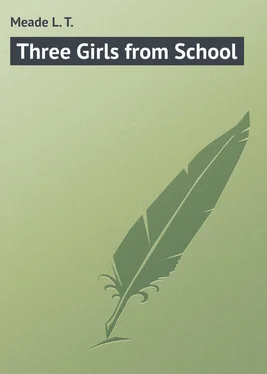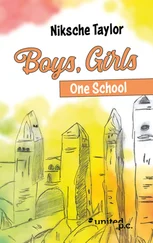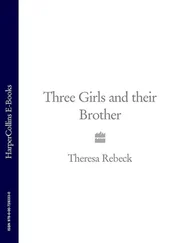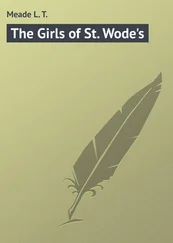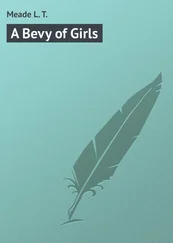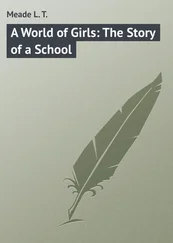L. Meade - Three Girls from School
Здесь есть возможность читать онлайн «L. Meade - Three Girls from School» — ознакомительный отрывок электронной книги совершенно бесплатно, а после прочтения отрывка купить полную версию. В некоторых случаях можно слушать аудио, скачать через торрент в формате fb2 и присутствует краткое содержание. Жанр: foreign_prose, foreign_children, на английском языке. Описание произведения, (предисловие) а так же отзывы посетителей доступны на портале библиотеки ЛибКат.
- Название:Three Girls from School
- Автор:
- Жанр:
- Год:неизвестен
- ISBN:нет данных
- Рейтинг книги:5 / 5. Голосов: 1
-
Избранное:Добавить в избранное
- Отзывы:
-
Ваша оценка:
- 100
- 1
- 2
- 3
- 4
- 5
Three Girls from School: краткое содержание, описание и аннотация
Предлагаем к чтению аннотацию, описание, краткое содержание или предисловие (зависит от того, что написал сам автор книги «Three Girls from School»). Если вы не нашли необходимую информацию о книге — напишите в комментариях, мы постараемся отыскать её.
Three Girls from School — читать онлайн ознакомительный отрывок
Ниже представлен текст книги, разбитый по страницам. Система сохранения места последней прочитанной страницы, позволяет с удобством читать онлайн бесплатно книгу «Three Girls from School», без необходимости каждый раз заново искать на чём Вы остановились. Поставьте закладку, и сможете в любой момент перейти на страницу, на которой закончили чтение.
Интервал:
Закладка:
“I am afraid I neither know nor care,” replied Priscilla.
“That is very selfish of you, for you ought to care. Well, I will tell you. She has got to stay at school, whether she likes it or not.”
“Lucky, lucky girl!” said Priscilla.
“But that is just the point, you old silly. She doesn’t consider herself at all lucky. She hates and detests school, and wants to go; she would give all the world to go.”
“And can’t she?”
“No; at least there is scarcely a chance. Her aunt has subjected her to a ridiculous test. She says that if by any chance Mabel wins the first prize in the literature competition she may leave school and join her in Paris. If she does not win it, she has to stay here for another year. Mabel is nearly mad, for of course she has not a chance of the prize.”
“Not a chance,” said Priscilla.
“But you don’t care about winning it, and you are the one who is sure to do so.”
“I don’t greatly care,” said Priscilla. “Of course, I would rather win than not win; that is about all.”
“Suppose – suppose,” said Annie – “I am not saying it could be done, and I am not saying it is right – I am not pretending to any conscience in the matter; but — suppose – you and Mabel changed essays; and – suppose you had your dearest wish, and Mabel her dearest wish – you stayed at school for another year and Mabel went to Paris to join her aunt. Now – just suppose.”
Chapter Three
To Catch at a Straw
Priscilla’s eyes, large, dark, grey, and full of feeling, opened to their widest extent as she turned them now and fixed them on her companion.
“What do you mean?” she said. “Do you know that you are a horrible girl to propose anything of this sort. How dare you? I don’t want to speak to you again.”
“Very well, Priscilla,” replied Annie, by no means offended, and speaking in a gentle, meek little voice. “I have heard of worse things being done before, and I only meant to help you both. You are both my greatest friends. One of you wants to stay at school; the other wants to leave school. It can be done by such a very simple matter as changing your essays.”
“It is horrible – quite too horrible even to think about,” was Priscilla’s response.
“But you said you didn’t care about the prize.”
“No; but I do care about honour. I am bad, but I am not as bad as all that.”
“Well,” said Annie, a little frightened at Priscilla’s manner and the look on her face, “the whole thing can do me no good; I don’t profit by it. I have got to stay at school, nolens volens ; and I think I should prefer Mabel as my greatest friend for the next twelve months to you. You won’t say anything about it, Priscie, for that would indeed be to ruin me, and I only meant to make you both happy.”
“Oh, of course I won’t tell,” said Priscilla. “I shall be leaving school in a fortnight, and then you won’t ever see me again. I can promise you to keep quiet with regard to this proposal of yours for that time.”
“Very well,” said Annie; “then that is all right. I will tell poor Mabel.”
“You don’t mean that you have suggested the thing to her?”
“Not exactly, but I have hinted at it – I mean at something – and she is very much interested. I’ll have to tell her that my little scheme is up a tree. Poor old Mabel! She is such a dear, too. We shall be glad to keep her at school.”
“Really, Annie, you are too extraordinary. Have you written a paper for the literature prize yourself?”
“I? Oh yes. But I have no imagination; not a bit. The subject is ‘Idealism’ – such an odious, impossible subject; but it has appealed to you.”
“It did appeal to me very strongly; I loved to write about it.”
“I can fancy you at it; you are just full of imagination.”
“It is my dearest possession,” said Priscilla. A new look came into her eyes. She turned her fine face and looked at her companion. “And when I leave school,” she added, “I shall take it with me. Even when I am working in the dairy and mending the children’s socks I shall still rejoice in it. I am glad you reminded me of it – very glad.”
“Well, I wish you joy of your future life. I would have helped you, but you won’t be helped.”
“You don’t suppose,” said Priscilla suddenly, “that I don’t just long to catch at any straw? You don’t suppose that I am not tempted? But even – even if I were to consider your base proposal for a single minute, what good on earth would it do me? The reason I am leaving school is because Uncle Josiah will not pay for my schooling. He certainly won’t pay for it any more because I have not won the literature prize.”
“But if I can positively promise you – and I am almost sure it can be done – that your schooling will be paid in another way, what then?”
“Annie, you cannot make me that promise. Say nothing more about it.”
“Oh, well, if you won’t talk of it, it can’t be helped. I am going to Mabel now.”
“Annie, I suppose you mean kindly, and I suppose I ought to feel that you do; but you don’t understand. It is a case of noblesse oblige with me. If I did stoop to what you suggest I should never, never have a happy hour again.”
“Very well,” said Annie. “I am glad I have not such a troublesome conscience.”
As she spoke she skipped away from her companion and joined the other girls on the lawn. Two little girls of about eleven and twelve years of age ran up to her. Their names were Flora and Violet Frere.
“What are you looking so solemn about, Annie?” asked Violet.
“Oh, I am worried. Poor old Priscie has got to leave school. Isn’t it an awful shame?”
Violet gave a sort of howl. “I can’t live without Priscie. I don’t believe it for a single minute. Where is she?”
“She is walking up and down in the shrubbery. I tell you what it is, Vi. You have great influence with her. You and Flora both go to her now, and put your arms about her, and pet her a lot, and tell her that she simply must not go – that she must stay with you whatever happens.”
“Come, Flora,” said Violet – “Thank you, Annie, for telling us. We’ll certainly go and make dear Priscie stay.”
“Yes,” said Flora. “I wouldn’t stay at school myself if Priscie were to leave. I should be a very naughty girl; I would run away.”
“And so would I,” said Violet. Annie stood still for a minute or two after the little girls had left her; then she went into the house. She felt troubled. Annie was by no means the best of girls. She had naturally a turn for crooked and underhand ways. She was ambitious and discontented with her own lot. When she left school she would go to stay with her uncle, the Rev. Maurice Butler. She would live in a musty old rectory in a very dull part of England, and see hardly any people, and try to devote her time to mothers’ meetings and school feasts, and all the thousand and one things which occupy a young girl’s time when she happens to be the niece or daughter of the rector. Now, Annie had no taste for these occupations. She hated the holidays, which she had invariably to spend at Burfield Rectory. She had no appreciation for Uncle Maurice, although he was the best and kindest of men. She wanted to get into the world. She pined to enjoy herself. She was neither very pretty nor very clever. She was, as far as appearance went, an everyday sort of girl. It is true, she had lovely golden hair, but that was about all. At school she was the sort of girl who, apparently good-natured, makes many friends. Her object was to make friends. Her one desire in life was to secure the goodwill of her school companions, so that by-and-by they might invite her to their houses and give her the sort of good time she had always pined for. She knew in a vague sort of way that if she could get one of these girls more or less into her power, she might dictate her own terms. And now her chance had come. No prickings of conscience held her back; it did not even occur to her that she was acting badly. If she thought at all, it was but to pronounce Priscilla’s ideas of honour obsolete and impossible. She had little doubt that she could get Priscilla to yield to the plan which was forming itself in her own brain; and she was also pretty sure that Mabel would be even a more easy victim. Many of her school friends were fond of asking small services of Annie; for she was invariably good-natured, and had a sunny, pleasant temper. She was rather amusing, too, and to all appearance never thought of herself.
Читать дальшеИнтервал:
Закладка:
Похожие книги на «Three Girls from School»
Представляем Вашему вниманию похожие книги на «Three Girls from School» списком для выбора. Мы отобрали схожую по названию и смыслу литературу в надежде предоставить читателям больше вариантов отыскать новые, интересные, ещё непрочитанные произведения.
Обсуждение, отзывы о книге «Three Girls from School» и просто собственные мнения читателей. Оставьте ваши комментарии, напишите, что Вы думаете о произведении, его смысле или главных героях. Укажите что конкретно понравилось, а что нет, и почему Вы так считаете.
